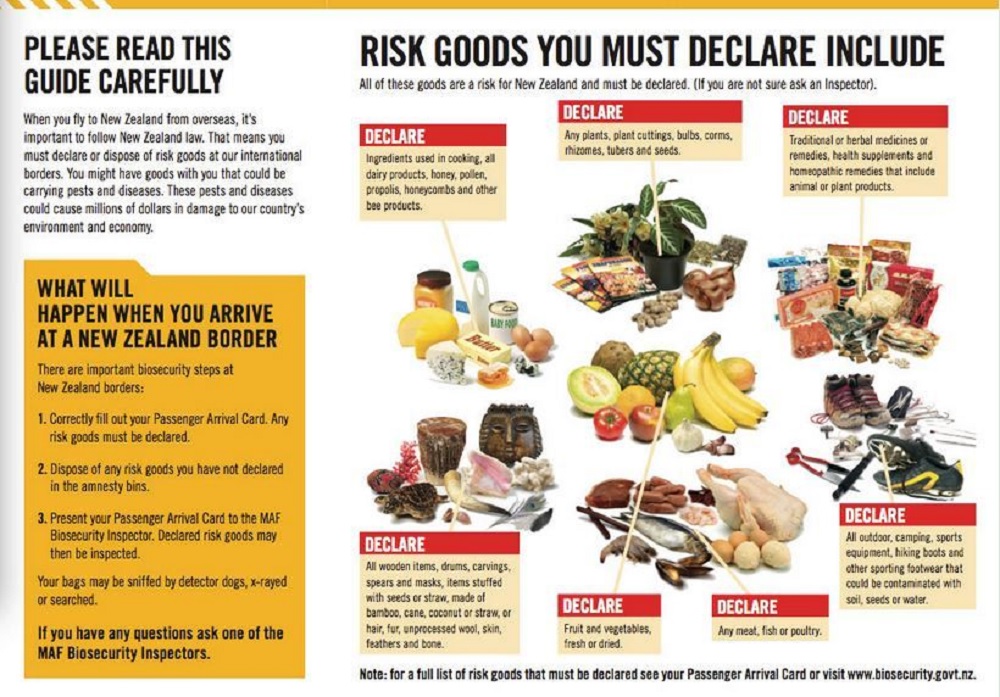What can you bring to New Zealand as a Visitor
New Zealand has in place quite stringent biosecurity laws at its borders to prevent the accidental or intentional entry of harmful pests, germs, foreign pathogens or diseases. All such high risk material, food or non-food related must be declared or be binned/disposed of in marked garbage bins at airports and seaports throughout New Zealand. If you are in doubt, then please declare such high risk goods.
What a New Zealand ETA (NZeTA) visitor should know
To ensure your landing in New Zealand goes easily you'll have to think about:
- Traveler Arrival Cards – these are typically given to you to finish by your team on your approach to New Zealand. The cards disclose to you what we consider are hazard merchandise
- Discard undeclared hazard merchandise in stamped reprieve receptacles on your landing.
- Disallowed and limited things like items from jeopardized creature or plant species.
- Encroachment charges, fines and punishments will be borne by you for not announcing hazard things on your Passenger Arrival Card. If you have other questions please check Frequently Asked Questions.
Example of what not to bring
- Used equipment, new equipment, socks, shoes, tent, horse riding gear, camping gear, scuba gear, fishing gear, these are allowed if they are cleaned and not dirty.
- BBQ, allowed if it does not have bugs, earth, diseases or other plant or animal material.
- Wood items like musical instruments, chopping board, souvenir, bamboo, MDF, guitar, allowed if they do not contain seeds, dirt, cane, bamboo, bark or other animal products.
After you arrive on New Zealand eTA Visa (NZeTA) and you do not declare prohibited goods
Why you're fined for failing to declare
When you land in New Zealand you have an obligation to declare all food, animal products, plants and other specific items that you possess. You are required to declare it on a Passenger Arrival Card. You're breaking the law if you don't declare risk goods you have in your possession. A quarantine officer will look at the answers you gave on the card and may ask you questions to assess the biosecurity risk of those goods.
You may not be aware but you will be breaking the law upon failure to declare:
- unintentionally
- by accident
- because you forgot
- because you were careless
- because you didn't know the rules or what was in your baggage.
In every one of these circumstances you've made an incorrect or false affirmation, which is an offense. In legitimate terms, it's known as a severe risk offense. That implies you may have violated the law regardless of whether you didn't intend to. It resembles a speeding ticket or a stopping fine.
Punishment for non-declaration
The punishment for a bogus announcement is a NZD$400 encroachment charge – regularly called a moment fine. You don't get a criminal conviction
In the event that you purposely make an off base or false presentation to attempt to hide things, the outcomes are much more regrettable. In case you're indicted for purposeful pirating, you could be fined up to NZD$100,000 and be condemned to as long as 5 years in jail.
The most effective method to abstain from getting a fine

You can keep away from the danger of making a bogus revelation (and getting a fine) by ensuring you recognize what is in your sacks and gear, and the things of anybody younger than 18 going with you.
If you are coming from India on a Cruise Ship or transiting to Australia, then you are eligible for a New Zealand eTA (NZeTA), please ensure you are not bringing in spices, fruits and vegetables on your arrival. There is a specific guidance available for you at items to declare.
Ensure that you have checked the eligibility for your Online New Zealand Visa. European Union citizens, French citizens, Polish citizens, German citizens, Canadian citizens and British citizens can apply online for New Zealand eTA.